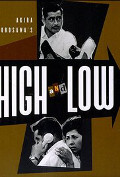
Japan 1963
Directed by
Akira Kurosawa
142 minutes
Rated M
Reviewed by
Bernard Hemingway

High And Low
Kurosawa’s admiration for John Ford’s Westerns is well known but here in a much lesser-known affinity with American pop culture he takes crime writer Ed McBain's novel, 'King's Ransom', and transposes it from Manhattan to Yokohama.
The film starts out with a carefully measured telling of the story of how an attempt by shoe company executive, Kingo Gondo (Toshiro Mifune) to gain control of his company is threatened by the mistaken kidnapping of his chauffeur’s son. Then follows a police procedural which details the way in which the perpetrator is finally caught, before a short closing third act that adopts a near Expressionist approach in focussing on the motive of the kidnapper, something which is symptomatic of Kurosawa’s concern with social/ethical issues already seen in films such as The Bad Sleep Well (1960). In this respect the literal translation of the film’s Japanese title Tengoku To Jigoku as Heaven and Hell would have been more eloquent.
The first section of the film is the strongest. Largely using a single stage-like set and precise mise en scène Kurosawa sets up the narrative with superb economy and has us sweating with Gondo over the ethical dilemma in which he finds himself - either bring off a financial coup that will set him up for life or save the life of his chauffeur’s child – while also exploring themes such as capitalist concupiscence and (rather ironically given Kurosawa's borrowings) the incursions of American culture into Japanese society (the two young boys play cowboys and Gondo draws a business moral from their game), a theme revisited in the latter part of the film when the kidnapper goes looking for drugs.
The film then shifts gear as it shows us how the ransom money is cleverly received by the kidnapper before it settles down to a detailed account of the work of a special police unit set up to catch to catch the perp. This latter section is less compelling in part simply because in the fifty years since this film was made the kind of forensic techniques are so much more sophisticate, partly because it goes on too long, pausing for comedic asides and taking an extended tour of Yokahama’s lower depths (the title of a 1957 film, Donzoko, by Kurosawa), and partly because by modern standards (such as the gaggle of flatfeet tailing the perp) it is at times awkward.
On the other hand the final section in which Gonzo visits the kidnapper prior to his execution is too abrupt to have the impact it deserved although Kurosawa’s use of an intervening security glass window to merge the two men’s faces is a brilliant device.
Want something different?





